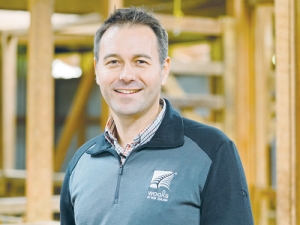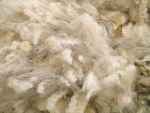They could prove a “significant gamechanger” for wool carpets, claims Mazey.
WNZ has acquired exclusive rights to the technologies through The Merino Company (TMC). The technologies have been used by TMC for their fine wool merino.
WNZ is now looking at applying these to strong wool. They considerably enhance the ‘white and bright’ properties, along with colour fastness enhancements that could cause a “paradigm shift” in the demand for end products.
Wools of NZ has reached a ‘proof of concept’ stage on the two technologies for strong wool, Mazey told Rural News.
“The concepts of both technologies look encouraging so now we are going through a due diligence process.”
They plan more testing and significantly larger scale trials in the first few months of next year.
WNZ’s acquisition of the exclusive global rights provides new opportunities for NZ strong wool in what had become the domain of man-made synthetic fibres.
The scour process, Glacial XTTM, produces whiter and brighter wool and enhances the properties of the fibre. The wool is then dyed using Kiteq, a process known to improve colourfastness in finished products such as carpets and rugs whilst achieving vibrant, clean colours on a par with synthetics.
Mazey says the processes have been used by TMC for apparel.
“They have been looking at the application to strong wool and we have come on board over the last seven months and worked with them looking at the early stage feasibility of it.
“We are encouraged by what we’ve seen and that’s why we have entered into this agreement with them.
“The first technology is the superior scour result and that will deliver whiter wool. That will give a superior start point for whatever it is used for.
“Screen printed carpet has become a growth area in China; enabling them to have the whitest wool as a base for that will be of benefit.
“There is the ability for Kiteq to come over the top of that. Using that very white start point then using this new dye technology will deliver very good pastel, so it will work well with the light colours and with the more intense shades – the blacks and dark shades.
“It will offer a broader spectrum of colours and some colours that we haven’t been able to get with wool.”
With Merino wool, TMC has succeeded in improving the colourfastness of the end product. So that potential can be translated into strong wool which could have an impact on warranties covering fading, etc.
“We have to do a lot of work on this but the early signs are that it can enhance the colourfastness of a carpet or rug,” he says.
“This is now of concern in the market so if we could improve that it would be a significant game-changer for wool carpets.”
The technologies will have application to all their markets so regardless of end use it can deliver a white start point, combined with the enhanced dyeing properties “that can go anywhere”.
“We are already working with specific partners in key markets to look at how we can build a strong value chain with this technology,” Mazey says.
“We’re not going to push it out to everyone…. We will be working with our partners in a controlled manner so we make sure the quality is maintained as best it can be.
“It is very encouraging at the moment; we just need to work through that due diligence.”
He says it is a great opportunity for WNZ, aligning with their objectives as an organisation.
“We are trying to find truly unique innovation that will help the company and more so our grower shareholders in trying to increase the demand for their wool.
“It has taken some time to get to this point but we’re excited about the opportunity this presents to our growers.”



















